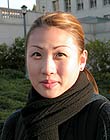UC Berkeley Web Feature
Bye-bye, "Berzerkeley": Surveys provide a peek at the real UC Berkeley students
BERKELEY – UC Berkeley students are all hippies. Or bleeding-heart liberals. Or nerds with their noses pressed against their computer monitors on Saturday nights. Which stereotype you hear depends on who you ask: people on the East Coast, for example, seem to view Berkeley as if time stopped for the university back in 1964, at the peak of the Free Speech Movement.
 'When
people say "UC Berkeley" they think of a bunch of weirdos and
super-smart people. Is it accurate? Well, the students here are good
students, they're smart, but there aren't really that many hippies
or weirdos.' 'When
people say "UC Berkeley" they think of a bunch of weirdos and
super-smart people. Is it accurate? Well, the students here are good
students, they're smart, but there aren't really that many hippies
or weirdos.' —John Lujan, 3rd year |
If you really want to know what Berkeley students are like, you ask them. That's what the Office of Student Research does each year, e-mailing every single enrolled undergraduate and asking them to fill out an extensive survey in exchange for the chance to win money and prizes. More than 10,000 of the university's 23,000 students took the bait for the Spring 2003 UC Undergraduate Experience Survey (UCUES), while 2,600 of the 3,600 entering freshmen filled out the Fall 2003 online Survey of New Freshmen. (Learn more about the surveys.)
"We've had an excellent response rate," says Gregg Thomson, director of the Office of Student Research (OSR). The 2004 survey goes out March 30, and Thomson hopes the responses will top 50 percent this time. "With such high numbers, we can get a pretty good idea of what students are thinking about."
The answers to the surveys provide a priceless peek into the collective hopes and fears, goals and pet peeves of enough UC Berkeley students to fill the Greek Theater several times over - while exploding a few stereotypes in the process.
Berkeley students work hard
They do, but perhaps not as hard as the rumors have it. While 34.1 percent of freshmen expected to have to study 16 to 20 hours per week outside of classes, only 15.9 percent of UCUES respondents reported actually doing so. The largest group, 28.2 percent, gets by on 6 to 10 hours of studying per week. (If you include time spent "surfing the Internet related to course assignments," however, 62.4 percent spent an additional 1 to 5 hours per week studying.)
 'Outsiders say all the time that Berkeley
is full of really smart people because it's such a prestigious
university. And it is prestigious, but you realize once
you come here that Berkeley's full of people of all sorts
— smart and not as smart.' 'Outsiders say all the time that Berkeley
is full of really smart people because it's such a prestigious
university. And it is prestigious, but you realize once
you come here that Berkeley's full of people of all sorts
— smart and not as smart.' —Olivia Or, 4th year |
Perhaps their organizational skills are to blame. "Poor" was how 16.5 percent of all students rated their time management skills, with another 36.8 percent calling them "fair" - slightly more than the 35.4 percent who checked "good." The proportions were about the same for entering freshmen, but these first-year students had a lot more anxiety about whether their time-management skills would measure up. Asked to rate theirs fears about "being overwhelmed, my first semester, with all the things that I will be expected to do," 86.4 percent were "somewhat" or "very concerned."
Making the grade was the No. 1 worry of entering freshmen, judging by a random sample of 100 write-in answers to the question "As you start Berkeley, what is the one thing that you are most concerned about?" A handful of first-years answered simply "academics," while others elaborated: "Being able to get very good grades while also experiencing the campus social life," wrote one student, while another doubted "whether I will be able to perform in such a competitive atmosphere."
Freshmen looking for love How important is forming romantic relationships, perhaps finding a long-term partner, while in college? Little or no importance: 30%Some importance: 41.1% Very important: 19.9% Essential: 9% |
Freshmen, take note: it does get easier. Most students seem to find a balance later on in their education. Only 12.9 percent of UCUES respondents said they handled stress poorly, while 51.1 percent said their stress-management skills were "good or "excellent."
Show them the money
More than a quarter — 26.3 percent — of freshmen said they were expected to contribute money to their parents to help pay their school bills. Although 57 percent of freshmen expected not to work at all their first year, only 14.7 percent said none after the first year. More than half thought they'd be working up to 10 hours per week after their first year.
They were right. According to the UCUES, approximately 52 percent of second-year students and upperclassmen had on- or off-campus jobs (or both) that required at least three to five hours per week.
Many were also taking the borrowing route. Almost half, or 44.9 percent, of freshmen expected to have loans of $10,000 or more by the time they graduated. That idea weighed on them: 74.9 percent of freshmen were "somewhat" or "very concerned" about financing their Berkeley education. However, most at least seemed to feel it would be money well borrowed: 58.9 percent of freshmen said that Berkeley's value for their money was a factor in choosing Cal over their second-choice college.
| What would you do differently to
improve your undergraduate education? Some write-in responses: • Be a resident student so I can have enough money and time to do what normal students do• Join a professor in their research; party more; procrastinate less • Ask someone to hold my hand as I planned all my classes; I obviously didn't know what I was doing • Be more active in clubs and not be so homesick • Choose roommates more wisely: live with people you like, but are not so close with • Decide on a major sooner • Get more involved in Berkeley - cultural events, school, clubs, etc. • Go to community college 2 years first • Go to more office hours • Had rich parents • I think I have learned a lot here - I wouldn't necessarily change anything |
Berkeley's value proposition seemed pretty clear: 64.6 percent of incoming freshmen thought Berkeley offered an advantage for getting into graduate or professional school, and an overwhelming 72.6 percent thought it would help with future employment opportunities. Only 10.6 percent of all undergraduate respondents planned to stop their schooling at their bachelor's degree. Another 27.3 percent intend to get a master's, 21.5 percent a doctorate, while roughly a third plan to continue on to either law, medical, or business school (about 11 percent each). Not surprisingly, given the graduate-school ambitions, the most popular future careers were lawyer/judge (9.1 percent), physician (8.1 percent), and engineer (6.6 percent), although 11.9 percent of undergraduates admitted they "had no idea whatsoever" what kind of job they wanted.
Despite the white-collar aspirations, not all Berkeley students are driven career types. Although 57.7 percent of freshmen said that being in a position to make a lot of money after graduation was "very important" or "essential" to them, 71.2 percent said the same thing about being able to give back to their communities.
The melting pot is bubbling
Berkeley is famed for its diversity, and this is one stereotype that lives up to its reputation. A large majority, 62.8 percent, of freshmen cited a diverse student body as a factor in their decision to choose Berkeley, and they got their wish. Although 69.9 percent of Berkeley undergraduates were born in the United States, 23.9 percent learned to speak another language before English and 26 percent learned another language along with English.
 'People think there's a lot of Asians
here. And it's true, there are, but it's more diverse
than that. They also think we're all hippies, doing
pot — but it's not any more
than at other schools. The stereotype comes from
back when Berkeley really was a hippie school, with
lots of protests all the time and the Free Speech Movement.
Now people think of it more for its academic reputation.' 'People think there's a lot of Asians
here. And it's true, there are, but it's more diverse
than that. They also think we're all hippies, doing
pot — but it's not any more
than at other schools. The stereotype comes from
back when Berkeley really was a hippie school, with
lots of protests all the time and the Free Speech Movement.
Now people think of it more for its academic reputation.' -Yu Wei, 4th year |
That's because 55.7 percent come from families where neither the mother or father was born in the States - only 35 percent of students come from families where both parents were born here. In addition to the many UC Berkeley students who speak Cantonese, Mandarin, and Vietnamese, there are those with more exotic mother tongues such as Amharic (Ethiopia), Dari (Afghanistan), Kannada (India), Bahasa (Indonesia), Slovak, and Hungarian.
These students mix. Among all undergraduates, 76.1 percent thought understanding culturally diverse viewpoints was important and said they had made "some" or "considerable" progress toward that goal. Almost half, or 45.5 percent, had in-depth conversations "often" or "very often" with a student from a different race, ethnicity or country, with another 30 percent doing so "sometimes." That could be attributed to Berkeley's stereotypically tolerant atmosphere: 75.2 percent agreed or strongly agreed that students were respected regardless of their race and ethnicity.
The atmosphere of acceptance extends to other sensitive areas as well. Similar percentages, 73.2 percent and 75.6 percent, agreed or strongly agreed that students were respected regardless of religious beliefs and sexual orientation.
Berkeley students are children of the revolution
Nope. They're not. Nor are they all watching the "O'Reilly Factor," except maybe for their political science classes, but the flag- and/or bra-burning days are long behind us. Among all undergraduates, 59.7 percent had never engaged in a political protest or demonstration, and another 18.1 percent said they had done so only rarely. When asked to rate the strength of their political views, a surprising number - 37.1 percent - deemed them "weak" or very weak."
 'The
obvious stereotype that everyone has
is Berzerkeley — that there's a lot of political action on campus
all the time. Berkeley is pretty left wing, I'd have to agree, but not as much
as people think. I've met some aggressive
conservatives on campus, too. I think people here just like to get involved in
something.' 'The
obvious stereotype that everyone has
is Berzerkeley — that there's a lot of political action on campus
all the time. Berkeley is pretty left wing, I'd have to agree, but not as much
as people think. I've met some aggressive
conservatives on campus, too. I think people here just like to get involved in
something.'—Jeff Hughes, 3rd year |
Only 6.1 percent identified their political beliefs as "far left." The largest percentage, 42.2 percent, did say they were "liberal," but an almost equal group - 39.4 percent - claimed to be "middle of the road." "Conservative" students made up 11.8 percent of the respondents, and only 0.5 percent - 54 students out of nearly 10,000 respondents - said they were "far right."
And yet Berkeley's reputation as a liberal bastion is not a turn-off for prospective students. Among incoming freshmen, 60.8 percent said that the liberal environment made them lean toward Berkeley in choosing a college, 28.2 percent said it had no influence, and only 11 percent said it made them lean much or somewhat more toward their second-choice college. Again, the atmosphere of tolerance comes into play: 83.2 percent of all students agreed or strongly agreed that they could express their political beliefs.
Satisfaction guaranteed
But perhaps the most surprising area of responses, given the stereotype that Berkeley undergraduates often get lost at this huge, research-oriented university, was how UCUES respondents rated their overall satisfaction. More than three-quarters (83.4 percent) said they were "satisfied" or "very satisfied" with their academic experience, 82.6 percent were equally happy about their cultural and life experience, and 86.4 percent were satisfied or very satisfied with their overall UC experience.
And asked if they could make their college choices all over again, 85.9 percent agreed or strongly agreed that they would still pick Berkeley.
The Fall 2003 Survey of New Freshman was a collaboration between OSR and the Office of Admissions. The UCUES is part of a larger research project in which the Office of Student Research is participating, called the Student Experience in the Research University in the 21st Century (SERU21).

